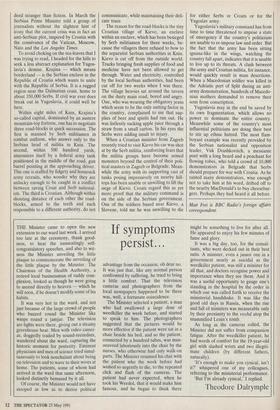If symptoms
persist...
THE Minister came to open the new extension to our ward last week. I arrived too late at the ceremony, thank good- ness, to hear the nauseatingly self- congratulatory speeches, and also to wit- ness the Minister unveiling the little plaque to commemorate the unveiling of the little plaque by the Minister. The Chairman of the Health Authority, a retired local businessman of ruddy com- plexion, looked as though he were going to ascend directly to heaven — which he will soon, if he doesn't modify some of his habits.
It was very hot in the ward, and not just because of the large crowd of people who buzzed round the Minister like wasps round a jamjar. The television arc-lights were there, giving out a steamy greenhouse heat. Men with video camer- as, doggedly trailed by sound-recordists, wandered about the ward, capturing the historic moment for posterity. Eminent physicians and men of science tried simul- taneously to look nonchalant about being on television and to wave to their wives at home. The patients, some of whom had arrived in the ward that same afternoon, looked distinctly bemused by it all.
Of course, the Minister would not have stooped as low as to derive political advantage from the occasion, oh dear no. It was just that, like any normal person confronted by suffering, he tried to bring a little comfort. That the television cameras and photographers from the local newspapers happened to be there was, well, a fortunate coincidence.
The Minister selected a patient, a man who had swallowed a large dose of weedkiller the week before, and started to speak to him. The photographers suggested that the pictures would be more effective if the patient were sat in a chair beside his bed, and so the patient, connected by a hundred tubes, was man- oeuvred laboriously into the chair by the nurses, who otherwise had only walk-on parts. The Minister resumed his chat with the patient who the week before had wished so urgently to die, to the repeated click and flash of the cameras. The patient had never expected, when he took his Weedol, that it would make him famous, and he began to think there might be something to live for after all. He appeared to enjoy his few minutes of fame and glory.
It was a big day, too, for the consul- tants, who were decked out in their best suits. A minister, even a junior one in a government nearly as suicidal as the weedkiller patient, was still a minister for all that, and doctors recognise power and importance when they see them. And it was a useful opportunity to gauge one's standing in the hospital by the order in which one was called forth to receive the ministerial handshake. It was like the good old days in Russia, when the rise and fall of ministers was measurable only by their proximity to the vozhd atop the mummified Lenin's tomb.
As long as the cameras rolled, the Minister did not suffer from compassion fatigue. After the weedkiller patient, he had words of comfort for the 19-year-old girl with slashed wrists and two illegiti- mate children (by different fathers, naturally).
`It's enough to make you cynical, isn't it?' whispered one of my colleagues, referring to the ministerial performance.
`But I'm already cynical,' I replied.
Theodore Dalrymple


















































 Previous page
Previous page